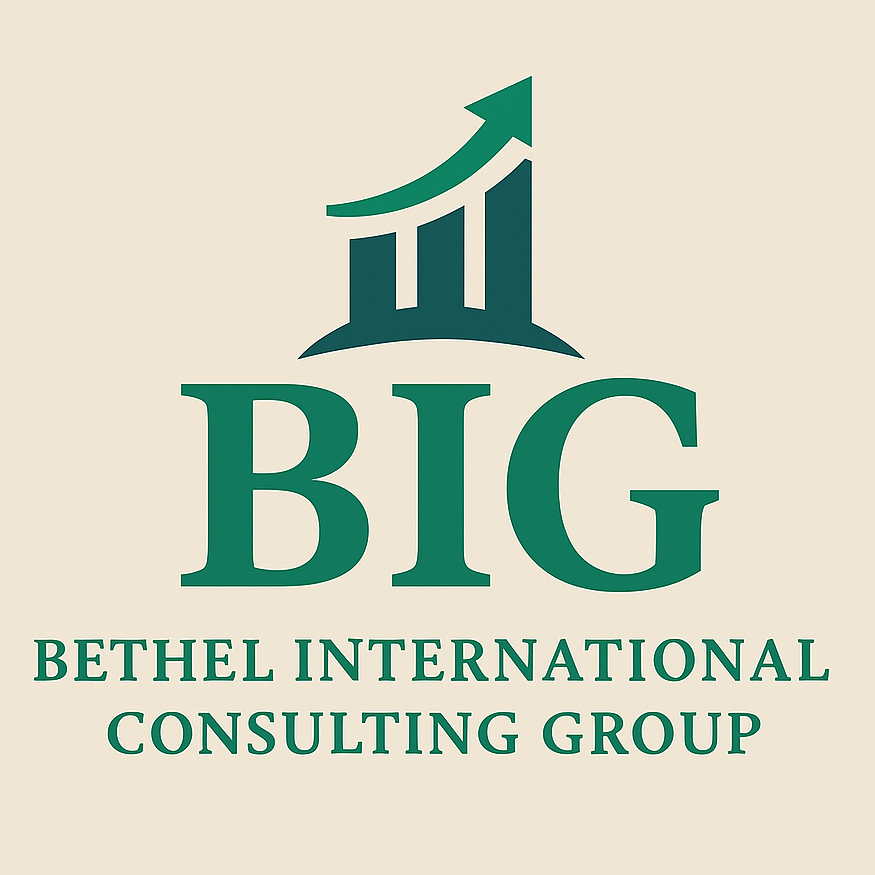
Our Story: From Crisis to Innovation
Join us as we share the narrative of BIG—a tale of learning, adaptation, and the power of integration in building organizations that thrive in the face of challenges and emerge stronger than ever before.

1 THE AWAKENING MOMENT
The founding vision of Bethel International Consulting Group emerged from a profound realization that occurred during Tony Karbo’s early career in international development. While working on what appeared to be a successful organizational development project for a prominent NGO in West Africa, Tony witnessed something that would fundamentally change his approach to consulting forever.
The organization had received extensive traditional consulting support—new management systems, updated organizational charts, streamlined processes, and comprehensive staff training. On paper, everything looked perfect. The donors were satisfied, the reports were glowing, and the project was considered a model for replication. Yet within eighteen months, the organization had collapsed entirely, torn apart by internal conflicts that the consulting process had not only failed to address but had inadvertently exacerbated.
What struck Tony most deeply was that the conflicts weren’t really about the new systems or processes. They were rooted in unresolved tensions between different ethnic groups within the organization, competing visions of community development, and historical grievances that had never been acknowledged, let alone addressed. The traditional organizational development approach had built a beautiful structure on a foundation of unresolved conflict—and when pressure mounted, that foundation cracked.
2 THE JOURNEY OF DISCOVERY
This experience launched Tony on a journey that would span multiple continents and countless communities, seeking to understand why so many well-intentioned organizational development efforts failed when they encountered real-world complexity. He spent years working with post-conflict communities, studying traditional conflict resolution mechanisms, and observing how successful organizations in challenging environments actually functioned.
In Sierra Leone, Tony worked with community leaders who had maintained social cohesion through civil war by integrating traditional peacemaking practices with modern organizational structures. In Ghana, he observed how market women’s associations had developed governance systems that could handle disputes while maintaining strong collective action. In post-genocide Rwanda, he witnessed the power of organizations that built reconciliation processes into their daily operations rather than treating them as separate activities.
Each experience reinforced a growing conviction: sustainable organizations in complex environments couldn’t simply import best practices from stable contexts. They needed to be built from the ground up with conflict resilience, cultural sensitivity, and community authenticity at their core.
3 THE INNOVATIVE SYNTHESIS
The breakthrough came when Tony realized that peacebuilding and organizational development weren’t separate fields that occasionally intersected—they were fundamentally interconnected disciplines that, when properly integrated, could create organizations capable of thriving in the most challenging circumstances.
This insight led to the development of what would become BIG’s signature approach: building “peace-ready organizations” that embed conflict prevention, cultural competency, and community engagement into their core operating systems. Rather than treating these as add-on components, BIG’s methodology makes them foundational elements of organizational design.
The approach was first tested with a community-based organization in northern Ghana that was struggling with internal divisions along ethnic and religious lines. Traditional consulting had failed because it focused on technical solutions while ignoring the underlying social dynamics. BIG’s integrated approach addressed organizational efficiency and conflict resolution simultaneously, creating new governance structures that honored traditional decision-making processes while meeting modern accountability requirements.
The transformation was remarkable. Not only did the organization resolve its internal conflicts, but it became a model for other community groups and eventually attracted significant international funding for its innovative approach to inclusive development. More importantly, it demonstrated that organizations could actually become stronger and more effective by directly addressing rather than avoiding their underlying tensions.
4 EXPANDING THE VISION
Word of this success spread throughout development networks, leading to requests for similar support from organizations across the region. Each engagement refined BIG’s methodology and expanded its understanding of how different types of organizations could benefit from integrated peacebuilding and organizational development.
Government agencies discovered that BIG’s approach helped them serve diverse populations more effectively while reducing complaints and improving public satisfaction. International NGOs found that organizations developed through BIG’s process had dramatically lower failure rates and higher sustainability. Community organizations reported not just improved functionality but stronger community connections and enhanced legitimacy.
The integration of health and sanitation services emerged from practical necessity. Tony observed that organizations struggling with basic workplace safety and health challenges found it difficult to focus on higher-level organizational development goals. By addressing these fundamental needs alongside governance and conflict resolution, BIG could accelerate transformation and ensure that improvements were built on solid practical foundations.
Similarly, courier and logistics services were added when clients repeatedly struggled with communication and coordination challenges that undermined otherwise excellent programming. Rather than referring clients to separate service providers, BIG developed internal capacity to provide comprehensive implementation support.
5 THE BROADER IMPACT
What began as a response to a single organizational failure has evolved into a comprehensive approach that challenges fundamental assumptions about how organizations should be developed and supported. BIG’s work demonstrates that organizations don’t have to choose between efficiency and authenticity, between professional standards and cultural sensitivity, or between individual performance and community cohesion.
The integration of seemingly disparate services—organizational development, peacebuilding, health and sanitation, and courier services—reflects BIG’s core understanding that sustainable organizations require holistic support that addresses practical, social, and structural needs simultaneously.
6 THE CONTINUING MISSION
Today, Bethel International Consulting Group represents more than a consulting firm—it embodies a proven alternative to traditional approaches that too often fail when they encounter real-world complexity. Every engagement builds on lessons learned from previous work while contributing new insights to the ongoing development of integrated organizational development methodologies.
BIG’s background story isn’t just about past experiences—it’s about an ongoing commitment to learning, adaptation, and innovation in the service of building organizations that can create lasting positive change even in the most challenging circumstances. The foundation laid through Tony’s early experiences continues to guide BIG’s work, ensuring that every client receives not just technical expertise but the hard-won wisdom that comes from understanding how organizations really succeed in complex, diverse, and sometimes difficult environments.
This story continues to unfold with each organization that chooses to build resilience rather than just efficiency, with each community that discovers it can honor its traditions while embracing innovation, and with each leader who learns that addressing conflict directly makes organizations stronger, not weaker. BIG’s background is ultimately about the power of integration—bringing together different disciplines, different perspectives, and different strengths to create something more effective than any single approach could achieve alone.
